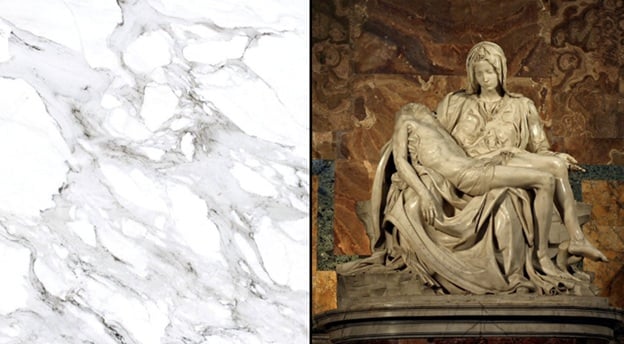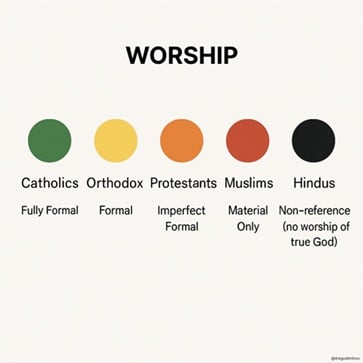
“Protestants don’t worship God!” “Muslims worship the same God as us!”
As Catholics seeking to defend the Faith, if we’re not careful or precise with our terms, we can risk tangling ourselves into making seemingly conflicting claims.
Lately, we’ve seen much mainstream debate around the question of whether Muslims can be said to “worship” God, and Tim Staples has covered this effectively before. There has also been a lot of great work accomplished in explaining how true worship of God entails the sacrifice of the Eucharist.
But it’s become clear that we need a more unified framework for using the term worship in interreligious apologetics. The cleanest and most theologically consistent way to do so is by distinguishing between material worship and formal worship—a distinction grounded in Thomistic metaphysics.
In Thomistic thought, matter is the raw “stuff” and potential of a thing, or its capacity to take on shape. Form is what gives matter definition, purpose, and completion.

For example, marble is matter (material), and the statue shape given to it by the sculptor is its form.
When applied to worship,
- Matter refers to the worshiper’s intent—the object toward which he aims his devotion.
- Form refers to the truth and structure of the worship—its alignment with God’s self-revelation, including right doctrine, sacraments, and ecclesial unity.
In other words, material worship is when we intend to worship God but may misunderstand who he is, whereas formal worship is when we worship God as he truly is, as revealed by Jesus Christ.
Material worship is like marble before it’s shaped: it has intent and capacity but no form.
A Muslim, for instance, intends to direct adoration to the Creator—this is materially oriented toward God—but his adoration lacks the form God has revealed (Trinity, Eucharist, Church).
Just as marble becomes a statue only when shaped, worship becomes formal worship only when shaped by what God has revealed.
This includes
- right belief (trinitarian doctrine),
- right means (liturgy, sacraments), and
- right relationship (communion with the Church).
Without the form, the intention remains real but unfulfilled.
So, then, utilizing these principles, we can map out a spectrum of worship that spans across the major religions:

Catholics offer worship that is both materially and formally complete—adoring the Trinity, united to Christ through valid sacraments, within the one visible Church.
Eastern Orthodox Christians also offer formal worship, albeit with imperfect communion, given their separation from Rome.
Protestants pose an interesting case. Depending on how one draws the line in applying these categories, their acts can either be considered imperfect formal worship or material worship with formal intent, since they worship the true God (Trinity, Christ) but lack valid Eucharist, priesthood, and full unity. They intend formal worship but miss key sacramental and ecclesial elements.
Muslims, as mentioned above, lack formal worship and can be said to worship God only materially. This is because, although they intend to worship the one Creator God, they reject the Trinity and the Incarnation and lack the Church and its sacraments.
By the way, what about modern Judaism, which is not on the spectrum? It offers material worship—directed toward the true God of Abraham—but lacks the full form of worship revealed in the New Covenant (Eucharist, priesthood, unity with the Church). The Old Covenant, as instituted by God through Moses, was formal worship for its time. Rabbinic Judaism, which developed after the destruction of the Temple and apart from Christ, preserves belief in the one true God yet is formally incomplete.
As for Hindus, they generally do not worship God materially or formally, since their devotional practices are often directed toward deities or metaphysical frameworks (e.g., pantheism) that do not correspond to the one, transcendent, personal Creator made known through Abrahamic revelation.
So, coming full circle, does that mean that Protestants and Muslims “worship God”? Yes—but not in the same way.
By distinguishing between material and formal worship, we can honor both the sincere religious intentions of others and the fullness of truth that God has revealed. Material worship expresses the heart’s aim. Formal worship expresses God’s truth—the shape he himself has revealed.
As Catholics, we’re called to honor the real, if incomplete, longing for God in others, without ever flattening the distinction between intention and truth. Just as malformed marble is not yet a statue, worship unshaped by the Eucharist, the Trinity, and the Church is not yet the fullness of worship God desires.
The Church acknowledges the sincere adoration offered by others but also teaches that not all worship is salvific. Only worship offered through Christ, who is the Way, the Truth, and the Life, is the path to full communion with God.
Thus, the Church invites all people to worship God as he truly is—in spirit and in truth (John 4:24)—through Christ, in his body, the Church. This is the full form of worship God himself has revealed and desires.



